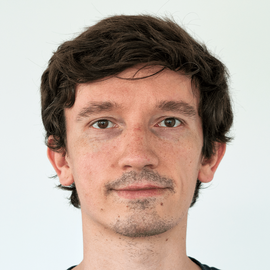Abstract
Baryons in the large limit of two-dimensional Gross-Neveu models are reconsidered. The time-dependent Dirac-Hartree-Fock approach is used to boost a baryon to any inertial frame and shown to yield the covariant energy-momentum relation. Momentum distributions are computed exactly in arbitrary frames and used to interpolate between the rest frame and the infinite momentum frame, where they are related to structure functions. Effects from the Dirac sea depend sensitively on the occupation fraction of the valence level and the bare fermion mass and do not vanish at infinite momentum. In the case of the kink baryon, they even lead to divergent quark and antiquark structure functions at .

Principal Investigator (PI)
Wieland Brendel received his Diploma in physics from the University of Regensburg (2010) and his Ph.D. in computational neuroscience from the École normale supérieure in Paris (2014). He joined the University of Tübingen as a postdoctoral researcher in the group of Matthias Bethge, became a Principal Investigator and Team Lead in the Tübingen AI Center (2018) and an Emmy Noether Group Leader for Robust Machine Learning (2020). In May 2022, Wieland joined the Max-Planck Institute for Intelligent Systems as an independent Group Leader and is now a Hector-endowed Fellow at the ELLIS Institute Tübingen (since September 2023). He received the 2023 German Pattern Recognition Award for his substantial contributions on robust, generalisable and interpretable machine vision. Aside of his research, Wieland co-founded a nationwide school competition (bw-ki.de) and a machine learning startup focused on visual quality control.